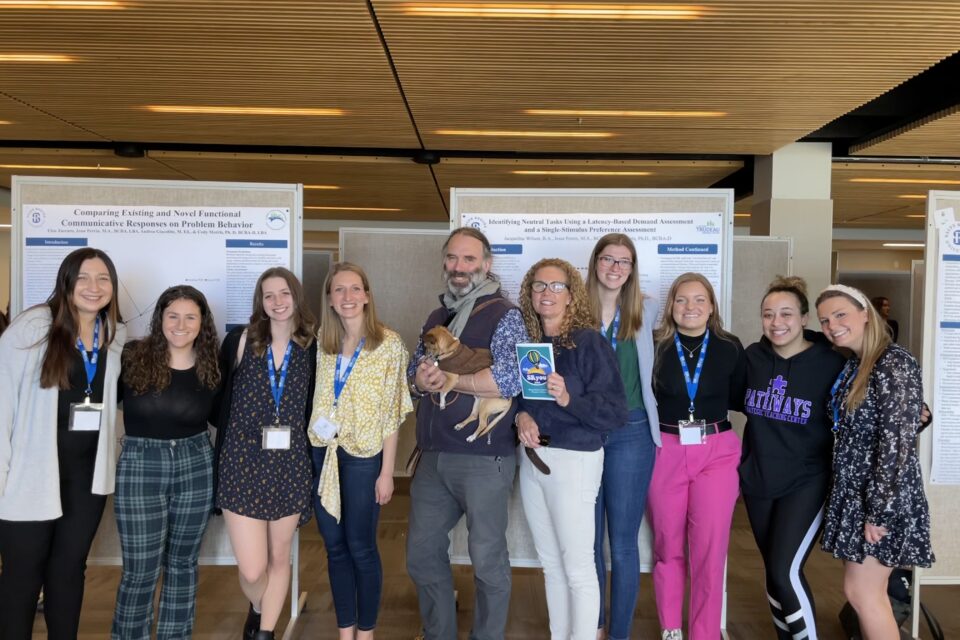Students, faculty present at Association for Behavior Analysis International convention

Students and faculty from Salve Regina’s undergraduate psychology program and graduate behavior analysis program will attend the Association for Behavior Analysis International’s (ABAI) upcoming annual convention, allowing them to build relationships, gain experience and learn more about how they can help those in need of psychiatric aid.
A unique opportunity for undergraduates
Psychology major Margaret Donovan will present “Defining the Practice of Behavior Analysis According to State Law” alongside other Salve Regina students. Her interest in psychology stems from her history with mental health and observations she made about her family and friends’ experiences.
“I [wanted] to know more about what is happening to me and my friends, and maybe somewhere down the line be able to help people,” she said.
Donovan’s research focused on psychology licensing in different states across the country. Along with her undergraduate partner Mackenzie Robichaud, she researched licensing documentation in 33 states and coded the information to find similarities.
“I think what’s most interesting is a lot of the states have almost the same exact wording,” Donovan said. “A lot of them are almost word for word the same.” Although she believes continuity in licensing can be a good thing, some of the process is broad and may be a valuable topic for future research.
Another step in the process for graduate students
Zachary Morais is halfway through the graduate program in behavior analysis. He completed his bachelor’s degree in psychology at the University of Massachusetts Boston and knew he wanted to work with children on the autism spectrum (AST) and those with developmental disabilities (DD). He was accepted to medical school twice prior to enrolling at Salve Regina, but when he discovered behavior analysis, he knew it was something he needed to pursue.
“I was like, ‘Wow, I can treat these semi-psychiatric symptoms in children with AST and DD without medication? That’s it. That’s what I need to do,'” Morais recalled.
He said that some people do not understand behavior analysis and its intended purpose, so his broader goal is to raise awareness and understanding of the field. “Not everyone seems to know what behavior analysis is or what it’s about, and that’s something I want to have a heavy hand in,” Morais said. “I think ABAI is a small step in that for me.”
Morais’s research involves two types of treatment – DRA and DRO. Both are ways to teach skills that are acceptable and reduce behavior that isn’t. The focus is on determining which treatments still work when a behavior therapist makes a mistake or is not doing everything correctly.
“What we found is that one of the treatments still reduces problem behavior even if the tech doesn’t always do it right,” Morais said. “That was really interesting, because it can guide practice when a behavior analyst is writing a treatment plan and they want to pick between two treatments.”
Fulfillment and opportunity for faculty members
Dr. Stephanie Jones, assistant professor in the Department of Psychology, teaches undergraduate and graduate courses. She notes that behavior analysis is a subfield of psychology that emphasizes the philosophy behind science’s ability to help people. The findings of behavior analysis research emphasize that no one is a lost cause and that people can change for happier and healthier lives.
Graduate program director Dr. Cody Morris was also involved in behavior analysis research for the ABAI convention. Jones and Morris aided their students by supervising their projects and meeting with them frequently to provide direct and adequate support for their research.
Jones said that the convention is an opportunity for students to have their findings published. If they receive the necessary feedback from professionals and experts in the field, they could submit their research to a peer-reviewed journal. Not only are students learning, gaining professional experience and networking, but they are establishing themselves within the community of behavior analysis.
Article written by student writer Anna K. Downes ’22

